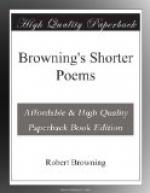CAVALIER TUNES. (PAGE 67.)
Note the swinging, martial movement, and the energetic spirit in these lyrics. For an account of the history of the period, see Green’s Short History of the English People, Chapter VIII, and Macaulay’s History of England, Chapter I. For an account of the qualities of the Cavaliers, see Macaulay’s Essay on Milton.
I. MARCHING ALONG
1. =Kentish Sir Byng=. The first of the family known to fame was George Byng, Viscount Torrington (1663-1733), who could not be the man meant here by Browning.
2. =crop-headed=. In allusion to the close-cropped hair of the Puritans. Long wigs were the fashion among the Cavaliers; hence the Puritans were nicknamed “Roundheads.”
7. =King Charles= the First. =Pym=, John (1584-1643). Leader of the Parliament in its actions against King Charles and the Royalist party.
13. =Hampden=, John (1594-1643). One of the leaders of Parliament, known principally for his resistance to the illegal taxations of Charles I.
14. =Hazelrig=, Sir Arthur. One of the members of Parliament whom Charles tried to impeach. =Fiennes=, Nathaniel. One of the leading members of Parliament. =young Harry=. Son of Sir Henry Vane, and a member of the Puritan party.
15. =Rupert=. Prince of the Palatinate (1619-1682), and nephew of Charles I. He served in the King’s army during the civil war.
23. =Nottingham=. “Charles I raised his standard here, in 1642, as the beginning of the civil war.”—Century Dictionary.
II. GIVE A ROUSE
16. =Noll= was a contemptuous nickname for Oliver Cromwell, the leader of the Puritans.
HOME-THOUGHTS, FROM THE SEA. (PAGE 70.)
This poem is a companion piece to Home Thoughts, from Abroad. It is, however, distinctly inferior to it in clearness, vividness of feeling, and lyric sweetness.
3. =Trafalgar=, The scene of the famous victory of the English admiral, Nelson, over the French fleet in 1805.
4. =Gibraltar=. The famous rocky promontory at the entrance of the Mediterranean. It has been held as an English fort since 1704.
SUMMUM BONUM. (PAGE 71.)
This little poem, published in 1890, is one of the good examples of a love lyric written by an old man whose spirit is still youthful. There are some similar things by Tennyson, in Gareth and Lynette, and elsewhere in his later publications.
Note here the somewhat exaggerated art of the poem in the alliterations and in the multiple comparisons.
SONGS FROM PIPPA PASSES. (PAGE 73.)
The drama of Pippa Passes is a succession of scenes, each representing some crisis of human life, into which breaks, with beneficent influence, a song of the girl Felippa, or “Pippa,” on her holiday from the silk-mills. She is unconscious of the influence she exerts. William Sharp says these songs “are as pathetically fresh and free as a thrush’s song in a beleaguered city, and with the same unconsidered magic.”




